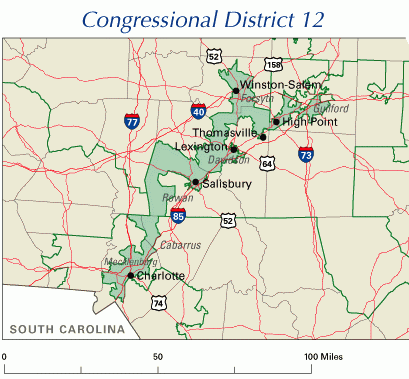NC NAACP threatens legal action to speed special congressional election

At a time Congress is expected to consider the fate of the Voting Rights Act following a Supreme Court decision gutting it, the residents of a heavily minority North Carolina congressional district created as a result of that landmark civil rights law will not have a representative in Washington -- at least not if Gov. Pat McCrory (R) gets his way.
But the North Carolina chapter of the NAACP is considering legal options to force McCrory to revise his plans.
Earlier this month, U.S. Rep. Mel Watt (D-N.C.) resigned his seat in Congress to become director of the Federal Housing Finance Agency. Rather than having voters go to the polls earlier than the already-scheduled election dates to choose Watt's replacement, McCrory announced on Jan. 6 that the special election for the seat would take place on the regular election schedule, with a primary, if needed, in May; a potential runoff in July; and the election to fill the seat during the general election on Nov 4. At that time, voters would vote twice for the same seat -- once for someone to fill the remainder of Watt's term, and again for someone to fill the seat for the full term beginning next year.
McCrory has said the plan would save the state $1 million and reduce "voter confusion." (The Charlotte Observer has a good breakdown on just how confusing a separate election could potentially be. ) But it would also result in the 700,000 residents of the 12th Congressional District going over 300 days without a representative.
"This is taxation without representation," Rev. Dr. William Barber of the state NAACP said during a Jan. 14 press call. "Taxation without representation, as we know through American history, is a form of tyranny."
Barber is the architect of the Moral Monday movement that has been protesting the policies of the McCrory administration and Republican-controlled state legislature since last year.
Barber and the NAACP are not alone in their opposition to the governor's plan. Last week U.S. Reps. David Price and G.K. Butterfield, both North Carolina Democrats, sent a letter to McCrory calling the delay unacceptable and unprecedented in recent congressional history. They pointed out that of the seven other vacancies in the 113th Congress, six were filled in an average of 126 days. The seventh, to fill the seat of deceased Rep. Bill Young (R-Fla.), is scheduled to take place 145 days after the congressman's death.
"The rationale you have offered, that it is both too costly and logistically impossible to hold the special election before November, is not convincing," Price and Butterfield wrote. "The 2013 filing period is fully 30 days away; not a single primary ballot has yet been printed for any precinct in the state. The assumption that North Carolina is better served by having one less advocate in the House for nearly a full year than by finding a cost-effective way to minimize the vacancy is seriously misguided. The fact that your decision requires so many of our state's citizen’s to forgo their constitutionally guaranteed right of representation for twice as long as common practice is indefensible."
North Carolina's 12th Congressional District was drawn in 1992 as one of the state's two majority-minority districts designed to give the state's African-American residents a chance to elect representatives of their choice. Snaking along the Interstate 85 corridor through the Piedmont from Charlotte to Durham, the district has drawn criticism as a race-based gerrymander and three legal challenges that have gone all the way to the U.S. Supreme Court. The current version of the district, drawn following the 2010 census, is 47.2 percent white, 44.6 percent black, and 7.1 percent Hispanic. Watt has held the seat since 1992, and in 2012 won re-election with over 79 percent of the vote.
In June, the U.S. Supreme Court in the Alabama case Shelby County v. Holder threw out as unconstitutional the Voting Rights Act coverage formula that determines which jurisdictions are subject to federal preclearance for election changes based on their history of voter discrimination. At some point this year, Congress is expected to revisit the coverage formula. Other crucial issues Congress is expected to take up during the time the 12th Congressional District would be without representation under McCrory's election plan include the farm bill, budgetary matters, and immigration reform.
Irving Joyner, a law professor at N.C. Central University and chair of the state NAACP's legal redress committee, said during the press call that the NAACP is in the process of reviewing its legal options for forcing the special election to be held earlier. He noted that while delaying the vote brings no benefit to the people of the 12th district, it brings significant benefit for McCrory and his party.
"The governor by his action has contributed to there being one less Democrat in Congress able to vote," Joyner said. "That provides time for the Republican opposition to gather strength and steam."
Tags
Sue Sturgis
Sue is the former editorial director of Facing South and the Institute for Southern Studies.
